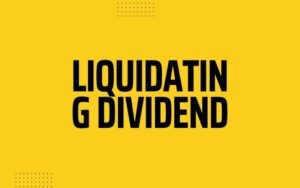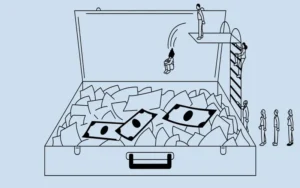Describe Laissez-Faire
The 18th-century economic ideology known as laissez-faire rejected any involvement by the government in commercial matters. The idea behind laissez-faire, a French phrase meaning “let you do” or “leave alone,” is that business and society will prosper more when the government stays out of the way of the economy. Part of free-market capitalism is laissez-faire economics.
Understanding
The idea that economic rivalry is a “natural order” that governs the world is one of the fundamental assumptions of laissez-faire economics. Laissez-faire economists contend that government involvement in commercial and industrial matters is unnecessary because this natural self-regulation is the finest regulation.
Consequently, they are against minimum wages, tariffs, trade restrictions, corporation taxes, and any form of federal participation in the economy, including legislation and oversight. Proponents see these taxes on laissez-faire economics as a productivity penalty.
Laissez-Faire past
Among the first well-articulated economic theories, the laissez-faire theory gained popularity in the middle of the eighteenth century. The Physiocrats, a group that thrived in France from roughly 1756 to 1778, are credited with creating it.
These scholars attempted to integrate scientific methods and ideas into analyzing wealth and economic output. These so-called “économistes” maintained that the vitality of a free society depended greatly on a free market and unrestricted economic rivalry.
Government intervention in the economy should be limited to protecting property, life, and individual freedom. Beyond that, Adam Smith, a later British economist, coined the term “invisible hand” to describe how natural, unchanging laws should govern economic processes and market forces.
Regrettably, an initial attempt to evaluate laissez-faire doctrines was unsuccessful. In 1774, Turgot, the Controller-General of Finances under Louis XVI, removed all restrictions on the tightly regulated grain business as a test, enabling unfettered trade between provinces for imports and exports. Thousands of French citizens starved due to merchants stockpiling supplies or selling grain in strategic locations, even outside the nation, for a higher profit. Still, prices skyrocketed when weak harvests caused scarcity. For several months, there were riots. The government regained authority over the grain market after order was restored in the middle of 1775.
During the late 18th and early 19th centuries of the Industrial Revolution, laissez-faire policies prevailed despite this unfavorable beginning. British economists like Smith and David Ricardo further developed these policies. As its critics pointed out, it also led to dangerous working conditions and widening wealth disparities.
Critics
The idea that capitalism is a morally dubious system that does not, by definition, defend the most vulnerable members of society is one of the main arguments against laissez-faire. On the other hand, laissez-faire proponents contend that societal advantages will accrue if people put their interests first.
Critics argue that economic imbalances and poverty are the actual results of laissez-faire. They contend that allowing an economic system to function unchecked or unregulated effectively marginalizes or worsens the plight of those most in need of support.
The British economist John Maynard Keynes, who lived in the 20th century, was a well-known opponent of laissez-faire economics. He maintained that each situation should be evaluated individually when determining whether to use government intervention or a market solution.
Laissez-Faire: Benefits and Drawbacks
Advantages:
- Government intervention in business is seen as oppressive and inefficient.
- promotes creativity and self-reliance
- encourages competition and free markets
disadvantages:
- Negative externalities can result from a lack of laws harming the environment and consumers.
- Wealth inequality is a natural result of competition.
- might encourage evil actors
What Does “Laissez-Faire” Really Mean in Meaning?
The French term “laissez-faire” literally means “let it be.” The story goes that in 1681, a meeting between a businessman named Le Gendre and the French finance minister Jean-Baptise Colbert gave rise to the expression “laissez-faire” in the context of economics. According to the narrative, Le Gendre said, “Laissez-nous faire,” which translates to, “Let it be,” in response to Colbert’s question on how best the government should support business. The word gained popularity as a term for the central economic theory of the physiocrats.
What Constitutes a Laissez-Faire Example?
An economy that adhered to the Laissez-Faire philosophy would not allow the government to influence the operation of the market, businesses, or economy. Instead, a free market would control prices and manufacturers’ behavior, encouraging them to be ethical. Such an economy does not exist. Government control and intervention are a part of any economy, even in nations with a solid libertarian ideology.
What is free-market capitalism?
Businesses may pursue their only goal of making a profit under laissez-faire capitalism, free from the burden of taxes or regulations from the government. This may lead to information asymmetries and negative externalities, making it possible for producers to conduct badly and still get away with it. Laissez-faire proponents contend extensive and expensive regulation is unnecessary since the market will sort out such unscrupulous actors. But in practice, dishonest people can continue their business for a long time. Without government testing and regulatory control to safeguard consumers, it may not be known, for example, if a vitamin manufacturer is filling their capsules with sawdust rather than herb powder.
Conclusion
- Laissez-faire is a free-market economic theory that says the government shouldn’t get involved in the economy.
- The French physiocrats came up with the idea of laissez-faire in the 18th century.
- Laissez-faire means that when the government gets involved in business and markets, it hurts the economy.
- Later, free-market economists built on laissez-faire ideas about how to make the economy grow, though some have said it leads to injustice.
- Some people disagree and say that markets need government oversight and control.













































